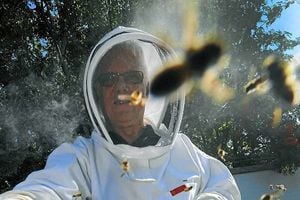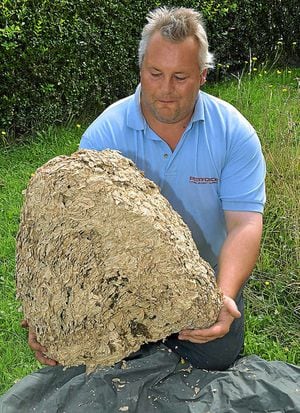September wasps will still have a sting in tail
It may be September but wasps are just starting to enjoy an Indian summer of their own.

Despite a disastrous summer for the insects last year, the number of wasps has increased dramatically in recent weeks – with the high numbers expected to continue into autumn.
Pest controllers today said they had seen an increase in the number of wasp nests being reported at homes and businesses across the country.

Christan Hems, of Dudley-based Pestforce, said: "This year the wasps seem to be very aggressive.
"Last year was a terrible year for wasps and there was a real drop in their numbers, probably because there was so much rain.
"This year though, the hot summer has caused their numbers to rise and they seem to be making up for it.
"I have also never seen their nests grow so fast. We've definitely had a lot of calls coming in about wasps of late."
No quantitative data is available for wasp numbers in the UK because, unlike butterflies and bees, there is no official recording scheme.
Experts also predict there will be more problems over the next few weeks as the insects are still growing their colonies now due to the prolonged summer.
When fruit begins to fall in the coming weeks, wasps are expected to become even more visible.
One beekeeper today said the increase in wasps was also affecting them.
Tony Gray, from the Shropshire Beekeepers Association, said: "There is no doubt about it, there has been a huge increase in the number of wasps this year. And this is affecting beekeepers in a bad way. The wasps are killing the hives by entering them, eating the grubs and stealing the honey. This kills the bees."
But wasp fan John Hughes, who is development manager at Shropshire Wildlife Trust, said: "Wasps are so important to wildlife and we should celebrate them rather than berate them.
"They are nature's pesticide eating all sorts of aphids and caterpillars.
"All summer they have been very busy with their nests and feeding the grubs. Now they have nothing really to do so they are getting in our way.
"In reality, wasps are wonderful and a great indicator of the health of the countryside."
Jim Eaton, who runs Pestforce in Shrewsbury, said: "It has been a very busy summer and I am being called out to wasp nests every week – averaging about three or four a day. And these aren't small nests. The average wasp nest will have about 8,000 wasps in it, but some of the bigger ones have up to 15,000 in them.
"The problem we have at the moment is that they are still growing their colonies. Some of the hives I have been to deal with have in fact split with a new queen setting up a new colony nearby. Often if I am called to one house, I will be called to another within a 10-house radius."
The painful truth - how to avoid being stung by an angry wasp:
Dont panic: The calmer you are the less anxious the wasp will be. Avoid the temptation to flap, run around or scream. It is sure to get the wasp angry and increase the chance of an airbound assault.
Pick your enemies: Not all wasp-like creatures are going to hurt you. There is one giant wasp species the Woodwasp, sometimes known as the Horntail Wasp, that despite its truly terrifying size, doesnt sting and is completely harmless. Likewise, bees tend to be less aggressive.
Watch what you eat: Although wasps do not have teeth, they have a sweet tooth. In the early summer they tend to go for protein-based foods such as meat. But by this time of year, theyve moved on to pudding.
Clear your apples: Fallen apples from trees are a feast for wasps. They like fruit, the riper and more rotten the better and they will literally get drunk on the juice.
Lock up your wine and fizzy drinks: Wasps will be attracted to anything sugary, especially fizzy drinks and wine.
Wasps love yellow: It is true that the insects are attracted by certain colours, especially white and yellow. Like most insects, they cannot see red, so its worth investing in a red shirt, and even some red trousers.
Dont splash the perfume: Even the scents in hairspray and hair gel are attractive to wasps.
Never ever poke a nest: A wasps nest is his castle, and he will defend it with utmost ferocity as will his thousands of mates. If you see a nest, leave it well alone. Get expert help, or simply avoid until it dies in the winter.





